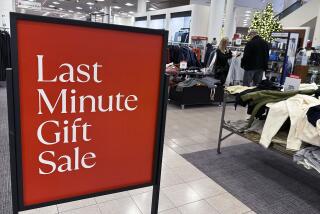Smart Shoppers Don’t Get Stuck on the Price Tag--They Bargain : Consumers: Many retailers, whether they advertise the policy or not, will meet a competitor’s price if you ask them to.
- Share via
NEW YORK — I had my eye on a pair of Italian hiking boots, debating the pros and cons of the style, fit and, finally, the price.
I tried them on at a local--and pricey--sporting goods store, but they were $20 more than the price in a catalogue I happened to bring along.
The manager, however, said the store would match the catalogue’s price. He made a sale and found a good customer.
Although I’m not by nature a price haggler, I saved time and money on this particular purchase.
Some retailers such as Toys R Us and CompUSA post policies that they will meet any competitor’s advertised price. Others don’t post that information, but they will indeed match legitimate advertised prices for identical merchandise.
This means it behooves the shopper to collect catalogues, keep circulars and scour newspapers for ads and bring all those along when shopping.
Before putting credit card or cash on the counter, put the advertisement down and ask, “Will you match this price?”
The answer, official policy or no, will often be, “Yes.”
In today’s highly competitive retail environment, getting and keeping customers is a challenge. Shoppers who do their homework can save themselves at least a little and often a lot.
It’s not just major chains that will match competitors’ prices, either. Local stores who want your business might match the big guys’ prices on the theory that if they do, you might come back.
Advising shoppers to “just ask” sounds easy, but how many consumers actually will?
“People don’t want to barter if they don’t know a product well and didn’t do their research,” said Frank Viggiano, professor of consumer services at Indiana University of Pennsylvania. “They feel ignorant, so they don’t feel assertive and are afraid of asking the wrong questions.” But negotiating a price “is a legitimate way to save money,” he said.
Because most Americans no longer work for themselves, Viggiano said, they do not have much business acumen. Further, many are trying to avoid conflict in their lives, so going into a store and negotiating a price is not something they would choose to do. “When people are put in the position of having to defend themselves or their ideas, they become intimidated,” he said.
The shopper most likely to negotiate a price is one who is price-driven, said Janet Wagner, associate professor of marketing at the University of Maryland.
If the shopper is “product attribute” driven, meaning he or she wants a particular stove, shirt or can of tuna, then price is less of an issue. In fact, this shopper may buy the item at any price, Wagner said.
“If you are emotionally tied to a purchase, the vendor will sense this and be less likely to negotiate,” Viggiano said.
As a consumer, you need to clarify to the seller that you have a budget and to ask the vendor if he or she can meet a price.
“But you also have to be realistic on pricing. This comes from research,” Viggiano said.
Recently, General Motors Corp. began promoting a “no-hassle, no-haggle” pricing policy. That campaign is based in part on a perception that consumers dislike bargaining with car dealers.
“In the course of doing our homework, we found that consumers most disliked having to work--haggle--with a dealer,” Saturn spokesman Greg Martin said.
Random calls to retailers found that not all openly promote a policy of meeting rivals’ prices but that many would do so if a customer brought in evidence of a lower price elsewhere.
A few, such as Eastern Mountain Sports, a chain of outdoor apparel and sporting goods stores, would not. A salesman at the New York City store said it is company policy to keep set prices.
Toys R Us said it has a posted price guarantee program and that it will match prices of any local competitor who advertises the same product as long as the other store has it in stock. At Wal-Mart Stores Inc., the policy is “not generally posted in stores,” said spokeswoman Jane Arend, “but it is understood.”
CompUSA said its policy is not posted but that it is spelled out in all advertising circulars, spokeswoman Laurie Levy said.
More to Read
Inside the business of entertainment
The Wide Shot brings you news, analysis and insights on everything from streaming wars to production — and what it all means for the future.
You may occasionally receive promotional content from the Los Angeles Times.










